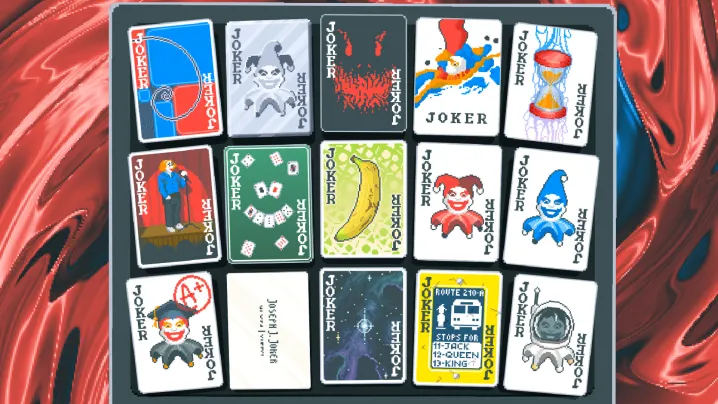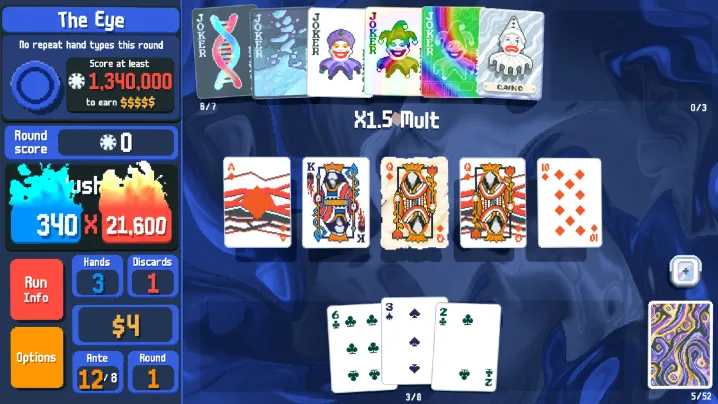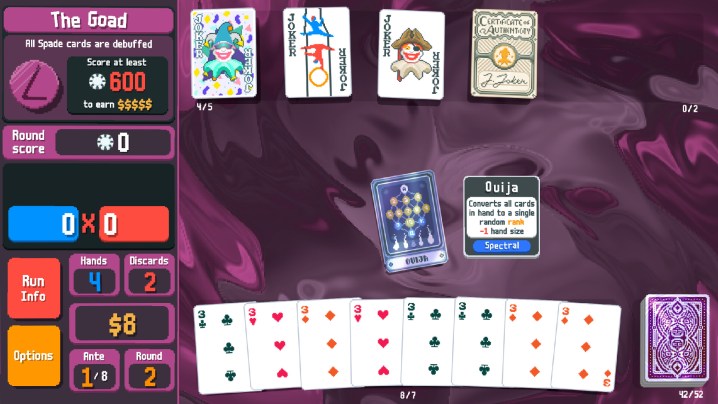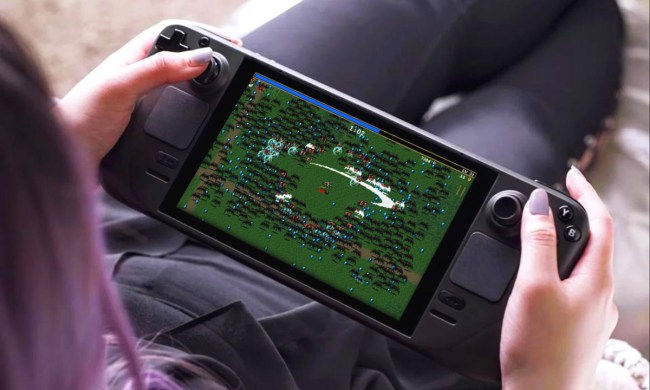
Have you ever stopped to think about your average deck of playing cards and what a design feat it is? Those 52 cards have kept people entertained for centuries thanks to limitless creativity. You can use them to play anything from Go Fish to King’s Cup. No matter how many times you shuffle them, there’s seemingly no bottom to the amount of games that can be dealt out.
The new video game Balatro isn’t just another example of an inventive card game, but a celebration of playing cards themselves. In this roguelite by LocalThunk, players simply have to make poker hands to rack up chips. That task becomes increasingly more complex with each round as players get bonus cards that chop and screw their deck in countless ways. Play your cards right and a pair of twos can become more valuable than a royal flush.
It’s a wildly creative concept, and one that gets at the heart of what makes playing cards such a timeless tool for game makers. You don’t have to throw out kings and queens to reinvent the deck; there’s no limit to the strategic depth in the 52 cards we all know.
Ante up
Balatro features an easy to understand core premise that quickly becomes complex. When I start my first run, I’m given a standard deck of 52 playing cards. I’m thrown into an ante, which consists of three blinds. In each, I need to earn a certain number of chips by creating poker hands. Each one pays out a base number of chips and has its own point multiplier. The face value of each card in the hand gets added to the chip count too, so a pair of queens will create more chips than twos.
That easy concept gets turned on its head starting in the second blind — and that’s where Balatro immediately got its hooks in me. In-between each round, I’m taken to a shop where I can spend the few dollars that I earn in each game to buy several cards that completely change how I play. Chief among those is Jokers, which are passive bonus cards that sit at the top of my screen. Some of those offer simple buffs, like adding four points to my multiplier for every heart card I play in a hand. Some are more complicated, like one that destroys any Joker to its right at the start of a blind to permanently add eight points to its multiplier.

On top of that, I can grab cards that level up my hands, increasing their payout, as well as tarot cards that can morph my deck. Some cards allow me to delete cards, while others can help me transform a handful of cards into a single suit. Some cards are even more radical, as they can place markings on my playing cards that give them extra bonuses. A steel-plated card, for instance, adds an extra multiplier to each hand so long as I don’t play it.
That little twist instantly makes Balatro engrossing. It feels like there’s no limit to the number of deck-building strategies I can craft through synergistic bonuses. I’d get a full picture of that in my first successful run, where I completed enough antes to beat a 100,000 chip challenge. Throughout the run, I’d get a Joker that would treat hearts and diamonds as one suit, and another that would do the same for spades and clubs. That meant I could play a flush on every single turn with a little discarding. I’d build a strategy around that by leveling up my flush multiplier every chance I could and adding more Jokers that brought me extra chips when I played a flush. By the time my run finished, I was making 30,000 chips every time by playing the exact same hand that would net me a few hundred earlier on.
And that’s only one strategy. In one run, I more broadly built a strategy around face cards, focusing on upgrades that buffed their value while cutting other cards out of my deck. In another, I’d take a Joker that would allow me to reroll the shop for free once every time I visited it and another that would get a multiplier relative to the amount of times I’d chosen to reroll the shop. My favorite synergy came from a deck where I’d get a high multiplier for every card in my deck. I’d pair that with a Joker that added a stone (a card with no value that added 50 chips if I played it with a hand) to my deck each blind. I ended up with an 80-card deck full of stones that would turn simple high card hands into tens of thousands of chips.

If it’s not already clear, I’m a little obsessed with Balatro. I haven’t been able to put it down since I started it. It has the same thrill as Hades in a weird way; no two runs ever feel alike. That’s thanks to how many different deck-building strategies are possible. With 150 Jokers, including a handful of unlockables, it feels like I’ve barely swam past the surface after 15 hours. I’ve only fully cleared one run so far, which is no easy task. Every third blind throws me into a “boss” round where I have to play around a strategy-killing twist. Some force me to win in a single hand, while others make entire suits worthless. They’re run-killing tests of skill that I’m determined to conquer.
Before I started Balatro, I had trouble seeing how much mileage LocalThunk would really be able to pry from the concept. How many ways can you slice up the same few poker hands? I’ll tell you when I figure that out, but don’t expect an answer any time soon. I imagine I won’t be leaving the table for a very, very long time.
Balatro launches on February 20 for PlayStation4, PS5, Xbox One, Xbox Series X/S, Nintendo Switch, and PC.



